Related Research Articles

Afrobeat is a Nigerian music genre that involves the combination of West African musical styles and American funk, jazz, and soul influences, with a focus on chanted vocals, complex intersecting rhythms, and percussion. The style was pioneered in the 1960s by Nigerian multi-instrumentalist and bandleader Fela Kuti, who is responsible for popularizing the style both within and outside Nigeria.

The music of Nigeria includes many kinds of folk and popular music, styles of folk music are related to the multitudes of ethnic groups in the country, each with their own techniques, instruments, and songs. Little is known about the country's music history prior to European contact, although bronze carvings dating back to the 16th and 17th centuries have been found depicting musicians and their instruments. The country's most internationally renowned genres are Indigenous, Apala, Ogene, Fuji, Jùjú, Afrobeat, Afrobeats, Igbo Highlife, Afro-juju, Waka, Igbo rap, Yo-pop, Gospel. The largest ethnic groups are the Igbo, Hausa and Yoruba. Traditional music from Nigeria and throughout Africa is almost always functional; in other words, it is performed to mark a ritual such as the wedding or funeral and not to achieve artistic goals. Although some Nigerians, especially children and the elderly, play instruments for their own amusement, solo performance is otherwise rare. Music is closely linked to agriculture, and there are restrictions on, for example, which instruments can be played during different parts of the planting season.

Fela Aníkúlápó Kuti, also known as Abami Eda, was a Nigerian musician, bandleader, composer, political activist, and Pan-Africanist. He is regarded as the pioneer of Afrobeat, a Nigerian music genre that combines West African music with American funk and jazz. At the height of his popularity, he was referred to as one of Africa's most "challenging and charismatic music performers". AllMusic described him as a musical and sociopolitical voice of international significance.
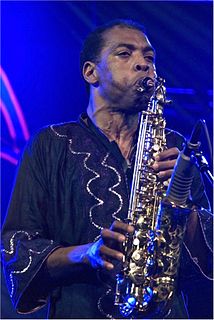
Olufela Olufemi Anikulapo Kuti, popularly known as Femi Kuti, is a Nigerian musician born in London and raised in Lagos. He is the eldest son of Afrobeat pioneer Fela Kuti and a grandchild of political campaigner, women's rights activist and traditional aristocrat Funmilayo Ransome-Kuti.
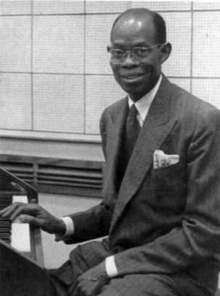
Chief Olufela Obafunmilayo "Fela" Sowande MBE was a Nigerian musician and composer. Considered the father of modern Nigerian art music, Sowande is perhaps the most internationally known African composer of works in the European "classical" idiom.

Tony Oladipo Allen was a Nigerian drummer, composer, and songwriter who lived and worked in Paris, France. Allen was the drummer and musical director of Fela Kuti's band Africa '70 from 1968 to 1979, and was one of the founders of the Afrobeat genre. Fela once stated that "without Tony Allen, there would be no Afrobeat". He was described by Brian Eno as "perhaps the greatest drummer who has ever lived".
Kalakuta Republic was the name musician and political activist Fela Kuti gave to the communal compound that housed his family, band members, and recording studio. Located at 14 Agege Motor Road, Idi-Oro, Mushin, Lagos, Nigeria, it had a free health clinic, and recording facility. Fela declared it independent from the state ruled by the military junta after he returned from the United States in 1970. The compound burned to the ground on February 18, 1977 after an assault by a thousand armed soldiers.
Gospel songs are a kind of motivational Christian music that has become a major part of Nigerian music. In the 1960s the Evangelical Church of West Africa Choir was popular, and in the early 1970s Bola Aare, Ebenezer Obey and later, Panam Percy Paul, Onyeka Onwenu, Tope Alabi, and Kefee were notable. Also, in the early 1970s and 80s Arch Bishop Benson Idahosa's choir, The Christian Redeemed Voices were known for their gospel sound. Idahosa would purchase instruments for the choir.

Zombie is a studio album by Nigerian Afrobeat musician Fela Kuti. It was released in Nigeria by Coconut Records in 1976, and in the United Kingdom by Creole Records in 1977.
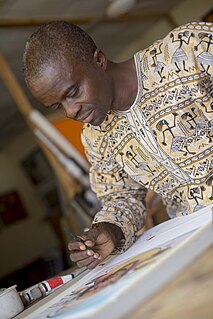
Lemi Ghariokwu, also known simply as Lemi, is a Nigerian artist, illustrator and designer who is most renowned for providing many of the original cover images for the recordings of Nigerian musician Fela Kuti.
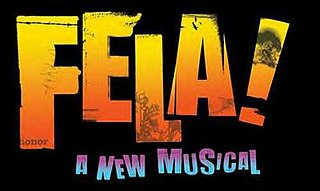
Fela! is a jukebox musical with a book by Bill T. Jones and Jim Lewis, based on music and lyrics by the late Nigerian singer Fela Kuti, with additional music by Aaron Johnson and Jordan McLean and additional lyrics by Jim Lewis. It is based on events in the life of groundbreaking Nigerian composer and activist Fela Anikulapo Kuti. It portrays Kuti in the days when he was the target of 1,000 government soldiers assigned to end his public performances at the legendary Lagos nightclub The Shrine.
Victor Abimbola Olaiya, , also known as Dr Victor Olaiya, was a Nigerian trumpeter who played in the highlife style. Though famous in Nigeria during the 1950s and early 1960s, Olaiya received little recognition outside his native country. Alhaji Alade Odunewu of the Daily Times called him "The Evil Genius of Highlife."

The CMS Grammar School in Bariga, a suburb of Lagos in Lagos State, is the oldest secondary school in Nigeria, founded on 6 June 1859 by the Church Missionary Society. For decades it was the main source of African clergymen and administrators in the Lagos Colony.
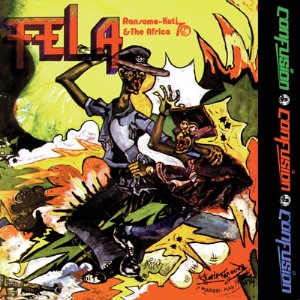
Confusion is a 1975 album by Nigerian Afrobeat musician Fela Kuti and his Africa 70 band. It was arranged, composed, and produced by Kuti, who recorded the album after choosing to emphasize his African heritage and nationalism in his music. Confusion is a commentary on the confused state of post-colonial Lagos and its lack of infrastructure and proper leadership at the time. Kuti's pidgin English lyrics depict difficult conditions in the city, including a frenetic, multilingual trading market and inextricable traffic jams in Lagos' major intersections.

Ambrose Campbell was a Nigerian musician and bandleader. He is credited with forming Britain's first ever black band, the West African Rhythm Brothers, in the 1940s, and was also acknowledged by Fela Kuti as "the father of modern Nigerian music". He worked with British jazz musicians in the 1950s, and later toured and recorded with Leon Russell in the US, where he lived for thirty years.

Thomas King Ekundayo Phillips was a Nigerian organist, conductor, composer and teacher who has been described as the "father of Nigerian church music"

Felabration is an annual music festival conceived in 1998 by Yeni Anikulapo-Kuti in memory and celebration of her father Fela Kuti, a Nigerian musician and human rights activist known for pioneering the afrobeat genre of music. The one-week-long event which is held annually at the New Afrika Shrine in Ikeja, attracts visitors from different countries and has thus been considered as an official tourist destination by the Lagos State Government.
Samuel Akpabot was a Nigerian music composer, ethnomusicologist and author.
Benson Idonije is a Nigerian broadcaster and music critic popularly known for being the first band manager of Afrobeat musician Fela Kuti. Regarded as one of Nigeria's most revered music critics, he was part of the pioneering group of broadcasters who started Radio Nigeria 2 in 1977.
Toby Foyeh is a British, Nigerian-American musician and guitarist. Born in London, England to Nigerian parents, he is currently based in the Washington, D.C. area of the US. Although essentially self-taught, he studied music at Berklee College of Music and Howard University where he also earned a degree in film directing.
References
- 1 2 "Steve Rhodes (1926-2008)". The Nation, Lagos. 2008.
- ↑ Collins, John (2015). Historical trends of Nigerian indigenous and contemporary music. Lagos: Rothmed Press. p. 15.
- ↑ Asobele, Timothy (2005). Fela: Kalakuta notes. Middletown: Wesleyan University Press. p. 32.
- 1 2 3 Dosunmu, Oyebade (2008). "Steve Rhodes (1926-2008)". /. Afrobeat Journal.